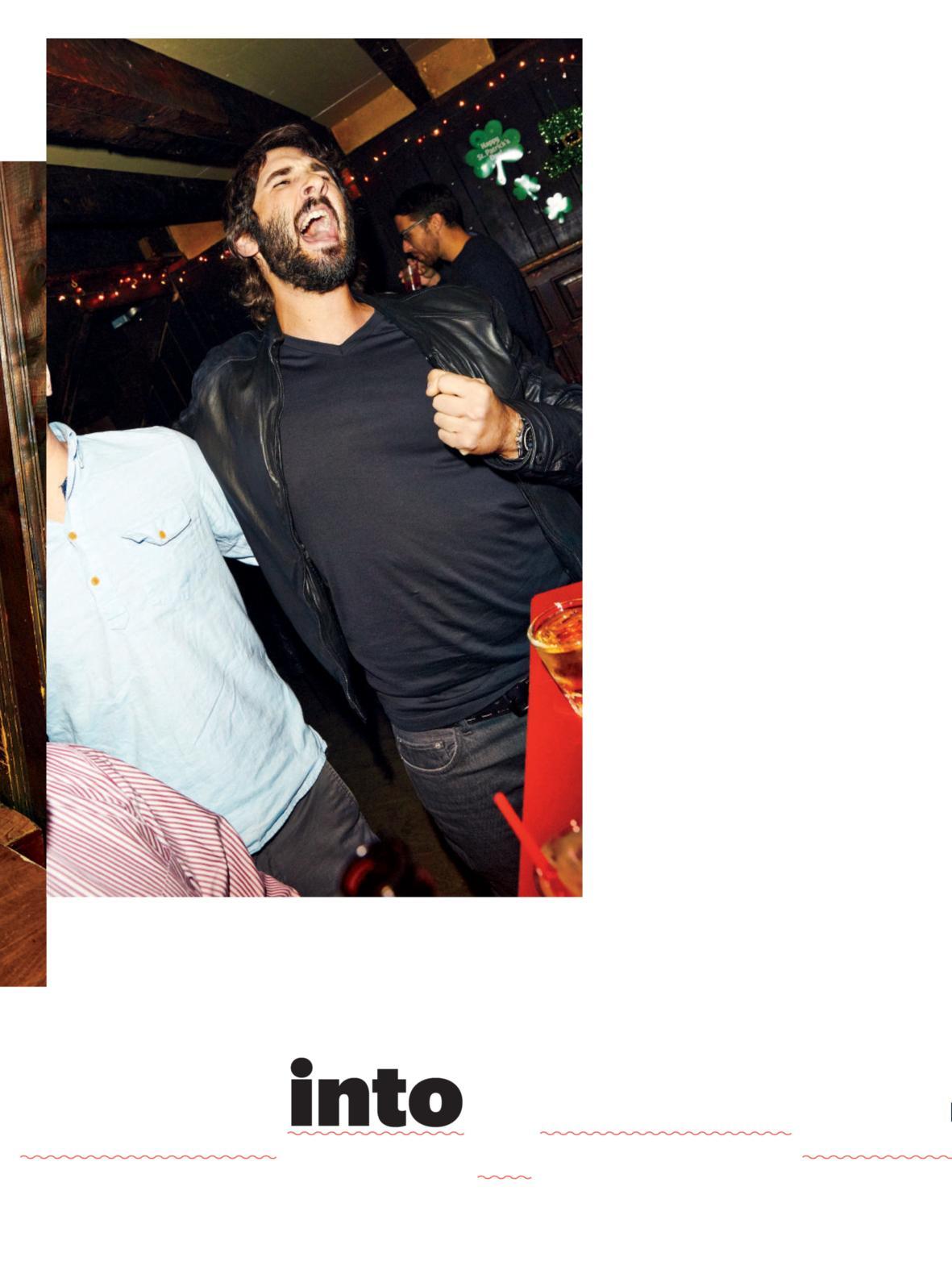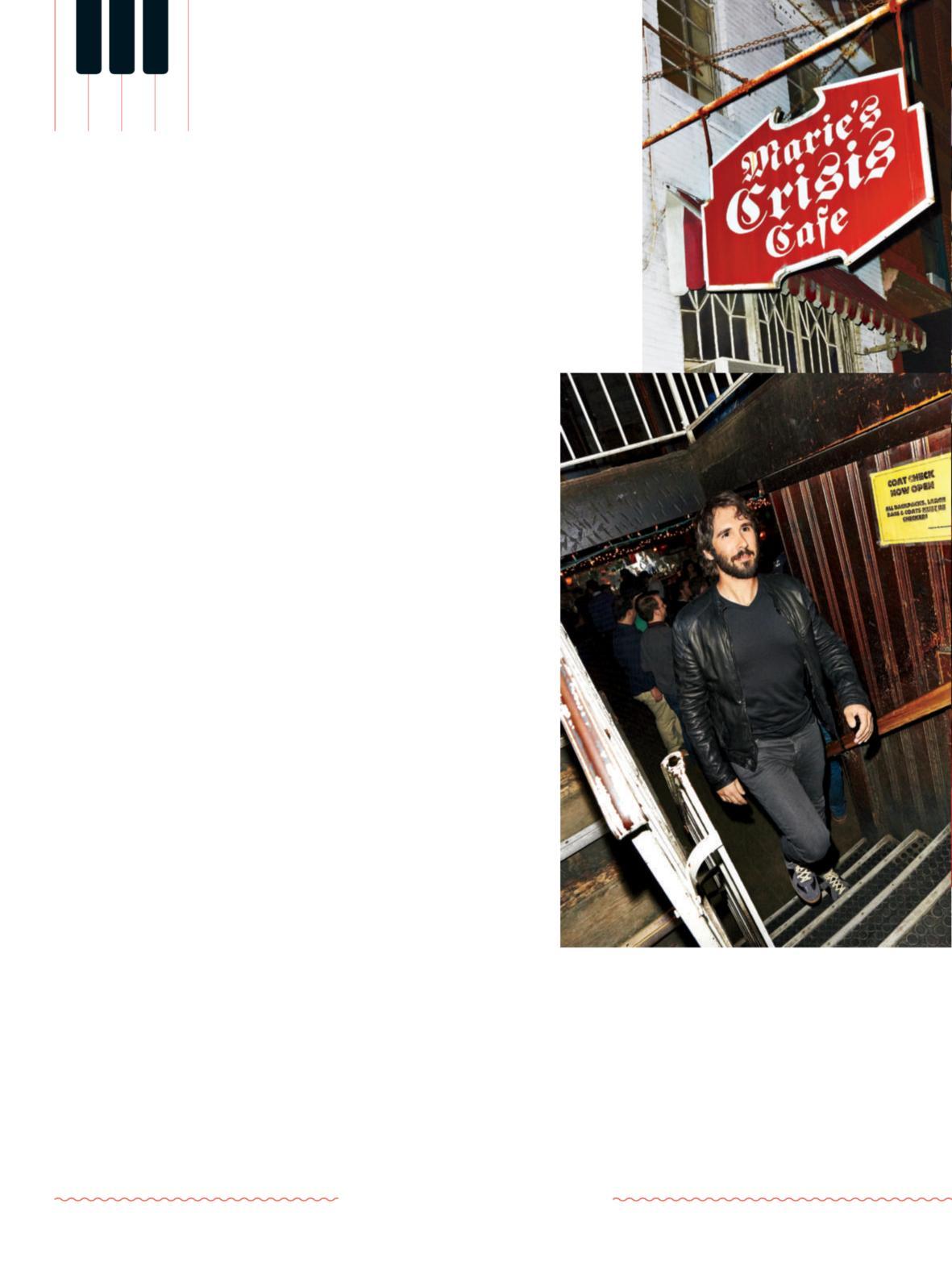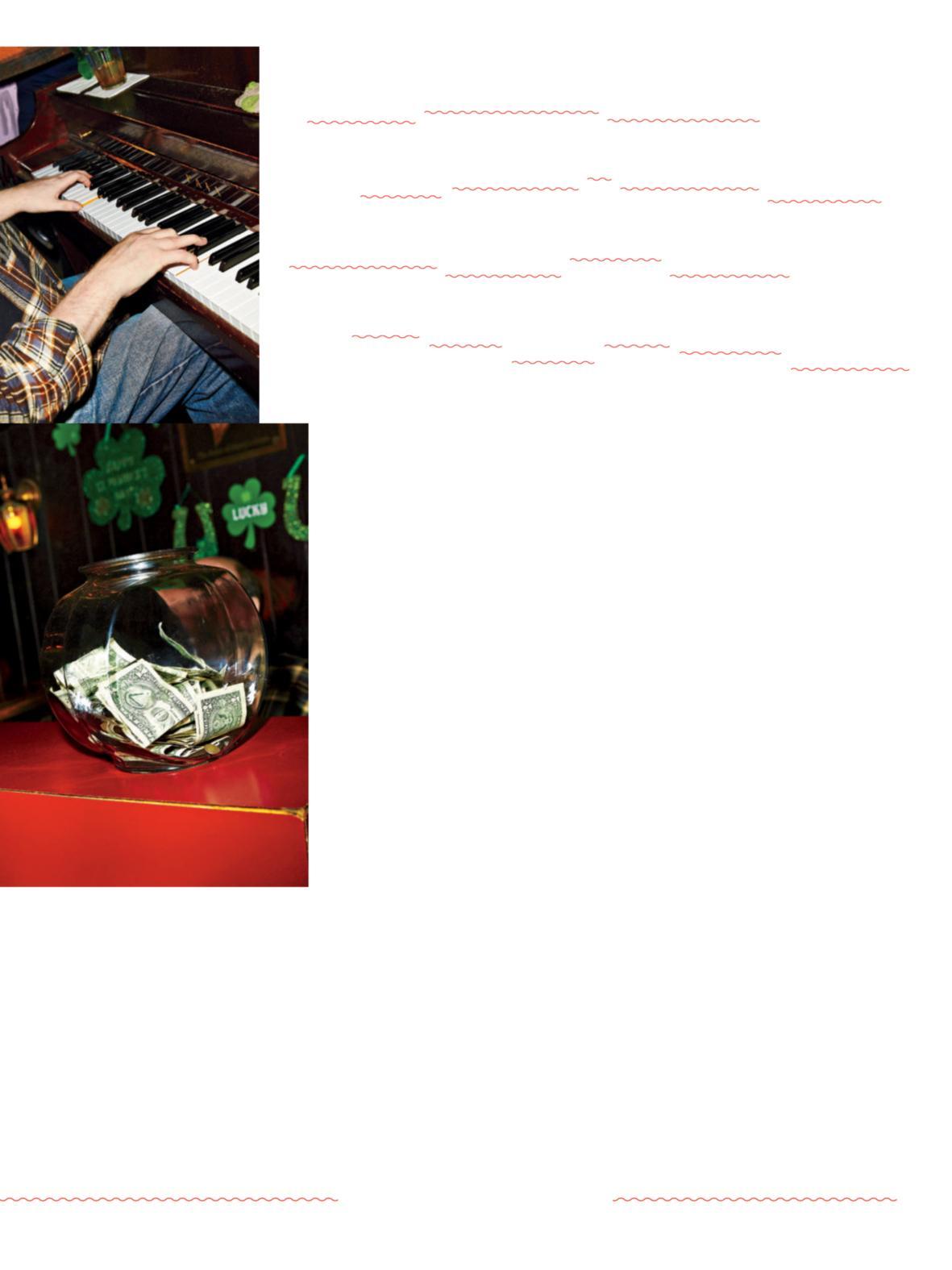
8 minute read
Josh Groban The superstar is about to release his seventh album— but first, a tune-up. BY MARC SNETIKER
A SMALL CROWD OF ABOUT 12 IS SITTING AT
Josh Groban photographed on March 12, 2015, at Marie’s Crisis Cafe in New York City
Advertisement
tables in a tiny piano bar, singing in unison as the pianist in the center of the room plays a jubilant number from the Broadway musical Pippin. When Josh Groban—the internationally acclaimed four-time multiplatinum artist— strolls in, heads turn. Celebrity visits are not unheard of at Marie’s Crisis Cafe, this Manhattan haunt dedicated to group-sing. (Everyone from Darren Criss to Jimmy Fallon has stopped by, and there’s YouTube proof.) And though fingers fly as guests text “Josh Groban just walked in,” their voices keep time and timbre. Groban, who has sung for the Pope, the president, and Celine Dion, hugs the wall. Of course, the 34-year-old knows the lyrics to the tune—he should, given that on April 28 he’ll release Stages, his seventh studio album, which consists entirely of musical-theater and film standards. The passion project features everything from a Phantom of the Opera duet with Kelly Clarkson to a chills-inducing cover of Willy Wonka and the Chocolate Factory’s “Pure Imagination.” But an all-show-tune album is a big leap of faith for both a fan base and an industry, even though Groban comes from a cutthroat theater background (he attended the prolific Los Angeles County High School for the Arts). It’s not in his nature to show up the other patrons, nor is he keen to sing on command— really, Julia Child doesn’t roast a chicken just because you invite her to a dinner party. But after 30 minutes and some whiskey, he takes a oban walksinto a seat beside the piano. Slinging his arm around a 30-year-old interior designer, Groban begins to assist on “Empty Chairs at Empty Tables,” a somber serenade from Les Misérables that Eddie Redmayne sang in the film. A surge of electricity jolts the crowd as they start to realize: They’re singing with Josh Groban. He smiles. These are his people. pianobar but first, a tune-up.
What was your process for choosing the songs on Stages?
The most obvious thing was, Can I sing my face off in a way that feels unique and passes the goose-bump test? There was stuff we realized was great in context of a story, but we had to concede that we weren’t making a Broadway show. Also, my voice type tackles more of that classic era of musicals. I would love to sing something from Hedwig, but it’s a little bit of a square peg in a round hole.
How did you persuade Kelly Clarkson to sing a Phantom of the Opera duet?
I was terrified! I thought she’d say no because she’s got a hit album and a new baby and such a busy career. But she’s actually a big Broadway buff. I’d wanted to sing with her for a while and I thought, Maybe this is crazy, but maybe this is the way to do it, with something people wouldn’t expect. And she’s got pipes.
Solos at Marie’s are rare, but an hour after he shows up, everyone’s wondering when Groban will perform. He has stayed beside the piano, talking about dream roles and high school drama with six regulars who occupy the prime seats next to the upright. Only one patron has dared to perform a solo, and Groban cheers gleefully. But finally, the time arrives.
The pianist plays the opening chords of “Anthem,” the triumphant love-conquers-all standout from Chess. Groban puts down his drink, and the bar chatter fades almost immediately. He closes his eyes and lifts his chin, and suddenly he is transformed. He is no longer the bashful bar newbie. He is Josh Groban, the velvet-voiced singer who entranced the nation with “You Raise Me Up” and “The Prayer.” Recognizing the magic, the pianist plays louder. Maybe he knows that this song from Chess is the exultant final track on Stages. Or maybe it’s because I slipped him a twenty.
Acting seems to be higher on your priority list these days. True?
Absolutely. One of the reasons why in the last five years I’ve done more acting than in the first seven is that I kind of stopped being overly protective of “the brand.” I stopped taking protective advice—from management, labels, whatever. You can use things like social media to your advantage. You can go out there and be a person.
You couldn’t do that when you were starting out?
There was this feeling of, No, you’ve got to be that guy on the pedestal staring down dramatically from the billboard all day, every day. You can be fun and funny with your friends, but when you’re in work mode, that’s the guy you are. I think there was a perception of me earlier in my career that wasn’t appealing to a talk-show host to have me on the couch, or wasn’t appealing to a casting director to say, “Hey, you’re funny, be in my movie.”
So what changed?
I got more comfortable with showing the other half of who I am. Honestly, that’s when people started asking me to be in stuff. It wasn’t that I never wanted to do it; it was just that I started to do it myself. I told myself, “Don’t be afraid to be funny with other people, don’t be afraid to show that you’re a weirdo who’s serious about your music but can also tell poop jokes if you feel like it.” I stopped being so precious about it.
But you were building a career back then. Surely you needed to self-censor, at least a little bit.
Things like Twitter didn’t exist when I started. There weren’t as many outlets for the other half back then. It’s ironic, the Ally McBeal thing. [Groban made his TV debut on the series in 2001.] I started my whole career doing a slapsticky acting job, and then it went silent. I’m grateful to independent comedies and people like Jimmy Kimmel, who saw that there was something there that would make people laugh. And then people called. I did The Office because Mindy Kaling direct-messaged me on Twitter.
Is it weird that everyone now wants you to play yourself?
They want me to play bizarro versions of myself. When I was on Glee, I wasn’t Josh Groban. I was “Josh Groban,” hitting on Schuester’s mom and burping. I like that. We don’t have, in the U.S., the phrase “taking the piss” out of yourself.

about
I think that it’s important to be selfaware and be able to just let the air out.
What’s your mother’s favorite version of Josh Groban?
Probably when I was cohosting with Kelly Ripa. That was an opportunity for me to riff and talk to people the way my mom knows me. She loves that show, she loves Kelly. At the beginning of my career, she was always like, “Well, you’re doing Regis, right? They’re going to book you on Regis, right?” I think my mom prefers TV me to real me. [Laughs] Midnight looms. Almost 40 people crowd into the room, and the latecomers descend on Groban. That means it’s time to go. He gladly poses for photos with the original dozen or so who welcomed him into the bar. He slips on his leather jacket, and his small entourage heads outside—but he is not with them. One last familiar song has stopped him. He stands in front of the exit, arms wrapped around the two patrons with whom he’s been singing since his arrival.
It could be the two whiskeys. It could be the finality of it all. Or it could be that the room is belting “What I Did for Love,” the iconic ballad from A Chorus Line about loss and optimism and the sacrifices artists make to pursue their dreams. Groban sings the loudest.
How would 17-year-old theater geek Josh have reacted to Stages?
The ironic thing is that it’s simultaneously such a change for me and also completely where I started. Seventeenyear-old me was really insecure, really terrified. I’m still insecure and terrified, but I’ve got all this experience; back then, I was just blowing in the wind.
What would you have told yourself?
It’s important to not be overconfident. For me to have gone into this business without the expectation of success or celebrity was the right way to do it. If I had been signed the old-fashioned way, somebody would have said, “You’re going to be a star! We’re going to change your clothes! And your hair!” I was signed with “You’ve got a good voice. Good luck to you.”

That’s it?
There was no feeling of “What’s his brand going to be? What’s his image?” None of that. It was “You guys have fun in your little studio. We’re working on Sugar Ray over here.” To not have to be within that bubble of fad was, in hindsight, a real blessing.
Do you feel like you occupy your own space in music?
There’s room for everybody. But I feel very blessed and surprised, too, that I’ve been able to stay in a lane that has rarely felt occupied. [Broadway legend] Barbara Cook, who was one of the first people to take me under her wing, told me, “It’s not about listening at the door of the audition room. It’s about realizing that there is really only one of you, and then everybody can find their own lane and occupy it.”
What do you want to do that you haven’t been given the chance to yet?
I’ve talked to people about maybe creating TV shows. Specifically, when people ask why I haven’t done a Broadway show, it’s because I don’t want to do it half-assed. I don’t want to do stunt casting in something that’s three months out of my year because I’m touring. I want to do it the right way. I want to do it the way I was taught early on.
Way back in high school?
When I finally got to high school, I had come from schools where I felt like an outcast. Theater was the escape. It kept me busy, kept me working. It was, for me, what sports was to other people. It changes lives. ■










